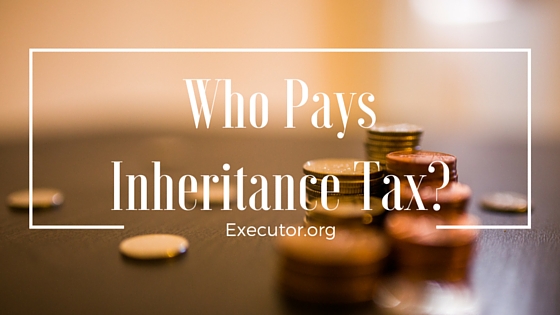
Who Pays Inheritance Taxes? – Executor Duties 101
“Who Pays Inheritance Taxes?” is part of the Executor Duties 101 series, an occasional series by Executor.org that highlights steps in the process of settling an estate.
When we die, the assets we leave to beneficiaries can be subject to inheritance taxes, which are also often referred to as death taxes. Since it can be confusing as to who, when, how — and even if — you will pay taxes on inheritances, it is important to understand the difference between terms such as inheritance tax and estate tax and the rules for each.
What is an inheritance tax?
An inheritance tax is a tax charged in certain states on money or property received from the estate of a deceased person. The beneficiary of the money or property must pay any due inheritance taxes individually.
As of the 2016 tax year, six states impose this tax – Iowa, Kentucky, Maryland, Nebraska, New Jersey and Pennsylvania. The inheritance tax rate in these states ranges from one percent to 20 percent.
How much inheritance tax do you owe?
Once an executor has divided up and distributed the deceased’s assets, any due inheritance taxes will be determined. You will pay the tax based specifically on the amount you received and if this amount is under a certain threshold, you might not owe any taxes at all. For example, a state might charge a 10 percent tax on all inheritances greater than $2 million.
If you inherited less than this amount, no inheritance taxes are due. So say you inherit $6 million from a friend, you will be required to pay taxes on everything other than the first $2 million. So your inheritance tax bill will be $400,000 – 10 percent of the taxable amount of $4 million – and you will be required to report this information on an inheritance tax form.
Inheritance tax exceptions
Keep in mind, there are exemptions that can spare you this cost under certain circumstances. For example, depending on your relationship with the deceased, you might receive an exemption or pay a reduced tax inheritance tax rate. In most states, spouses are considered exempt and children and other dependents might qualify for an exemption or partial exemption, too.
How are estate taxes different than inheritance taxes?
An estate tax also applies to the deceased’s money and property, but it is not charged to beneficiaries. It is instead taken out of the deceased’s assets prior to any monies or property being distributed to beneficiaries. Estate taxes can be charged on both a state and federal level and are typically due within nine months of the deceased’s date of death.
Keep in mind, like inheritance taxes, an estate tax on the federal level will not be levied unless the value of the estate exceeds a certain amount. For the tax year 2016, this amount is set at $5.45 million. So if the deceased’s entire list of assets – home, vehicles, properties, jewelry, etc. – is valued under $5.45 million, no federal estate taxes will be due.
State estate taxes, however, might still be charged. Fourteen states (Connecticut, Delaware, Hawaii, Illinois, Maine, Maryland, Massachusetts, Minnesota, New Jersey, New York, Oregon, Rhode Island, Vermont and Washington) and the District of Columbia collect estate taxes when a person dies.
Given the possible exemptions and varying rules, it is wise to consult with a tax adviser, tax attorney, or accountant for advice and to ensure you pay the proper amount of taxes on any inheritance you receive.
At Executor.org, we also can help you through the executor role. There are more than 100 steps in the process, and it can be stressful not knowing if you’ll miss some of them. Click here to create a custom plan to guide you, step-by-step, through the settling of an estate.
Use our tool to simplify the process and minimize your stress.